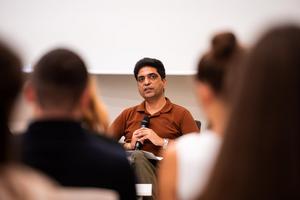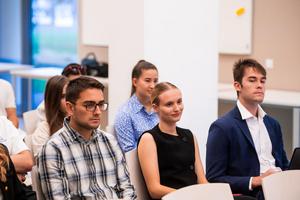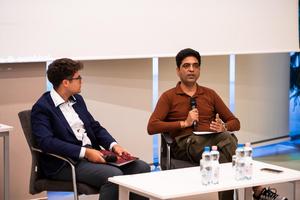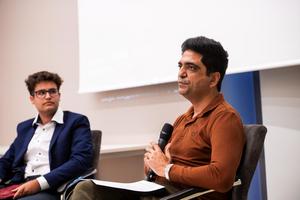Indian professor Gagan Deep Sharma, guest of the Ludovika Public Diplomacy Hub program, held a discussion with students of the International and European College for Advanced Studies at the Faculty of Public Governance and International Studies, Ludovika University of Public Service (LUPS). The event, moderated by Giulio Brunetto, Vice President of the College, took place on September 17 at the Orczy Road Dormitory.
Gagan Deep Sharma noted that India has now become the world’s fourth largest economy by nominal GDP and the third largest by purchasing power parity. The country has shown stable growth in recent years, a trend expected to continue in the years ahead. According to him, the strength of the economy lies in its 1.4 billion people living in a democracy, most of whom speak English fluently. Key sectors include agriculture and services, but India is also emerging in industry—such as automobile manufacturing and modern technologies. The country is outstanding in startups, financial services (particularly fintech), and is striving for zero emissions, with nuclear energy playing a role in its strategy.
India’s position in the global economy is also unique, as it maintains close ties with the world’s two leading powers and significant trade relations with the EU, Russia, and ASEAN countries. Sharma emphasized that for India, the EU represents the future of economic growth, with a free trade agreement close to being finalized. Also significant is the emerging green corridor between Mumbai and Trieste (IMEC).
In his view, in today’s era of geopolitical fragmentation, the key tasks are to embrace modern technologies (such as renewables) and ensure proper diversification. He stressed that now is the time for cooperation instead of rivalry—although this does not mean setting aside market competition.
When asked whether India could become a new economic pole alongside China and the US, the professor responded that in terms of demand, India already represents a third pole. In terms of supply, he argued that the startup revolution could further boost the country’s rise and help address social challenges over the next decade. Sharma predicted that in the coming years, BRICS+ may be formed with additional Global South countries joining. India holds a special position in this cooperation, since at the same time it maintains economic relations through the Quadrilateral Security Dialogue (Quad) with Japan, Australia, and the US. While BRICS originally aimed to counterbalance the West economically, the professor believes it is equally important for BRICS and the EU to deepen cooperation—a process that, in some areas, is already underway.
Text: Tibor Sarnyai
Photo: Dénes Szilágyi






